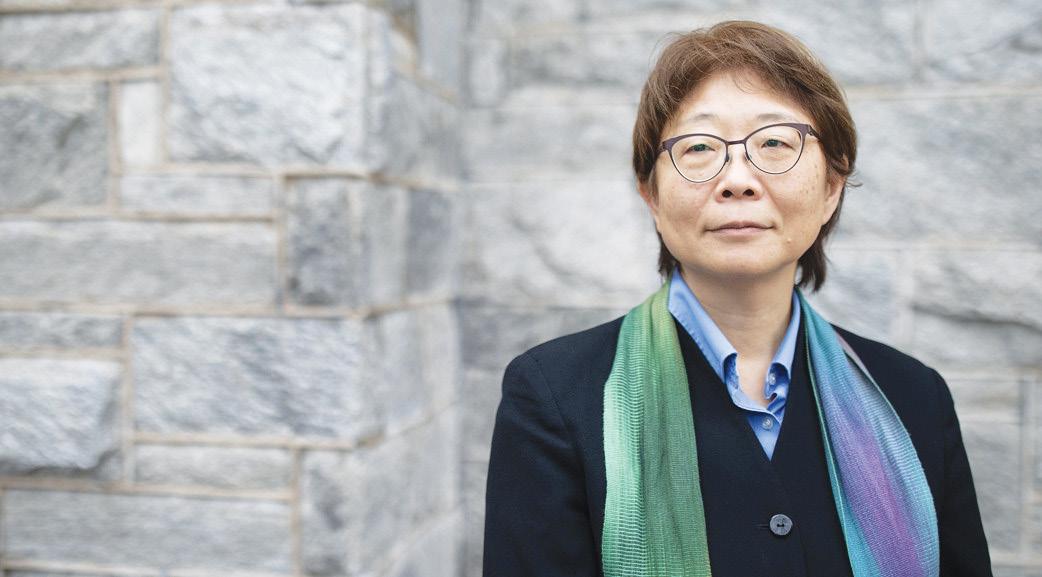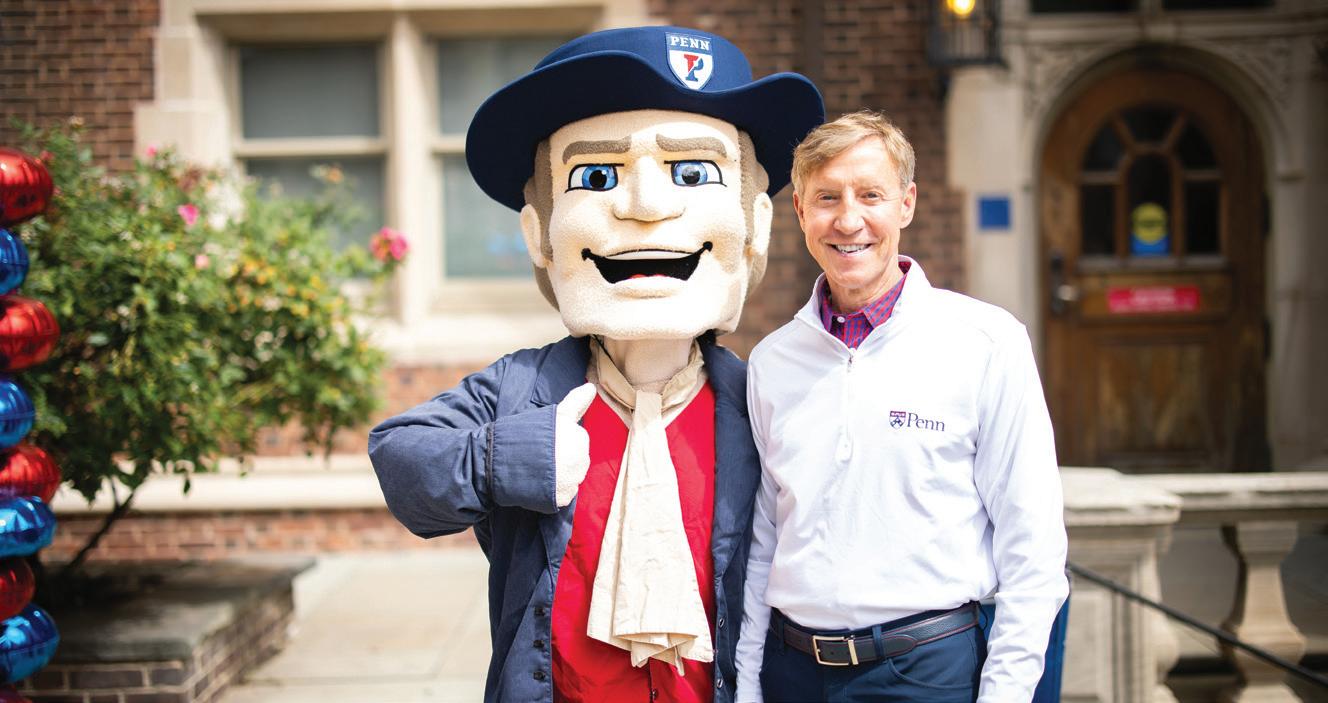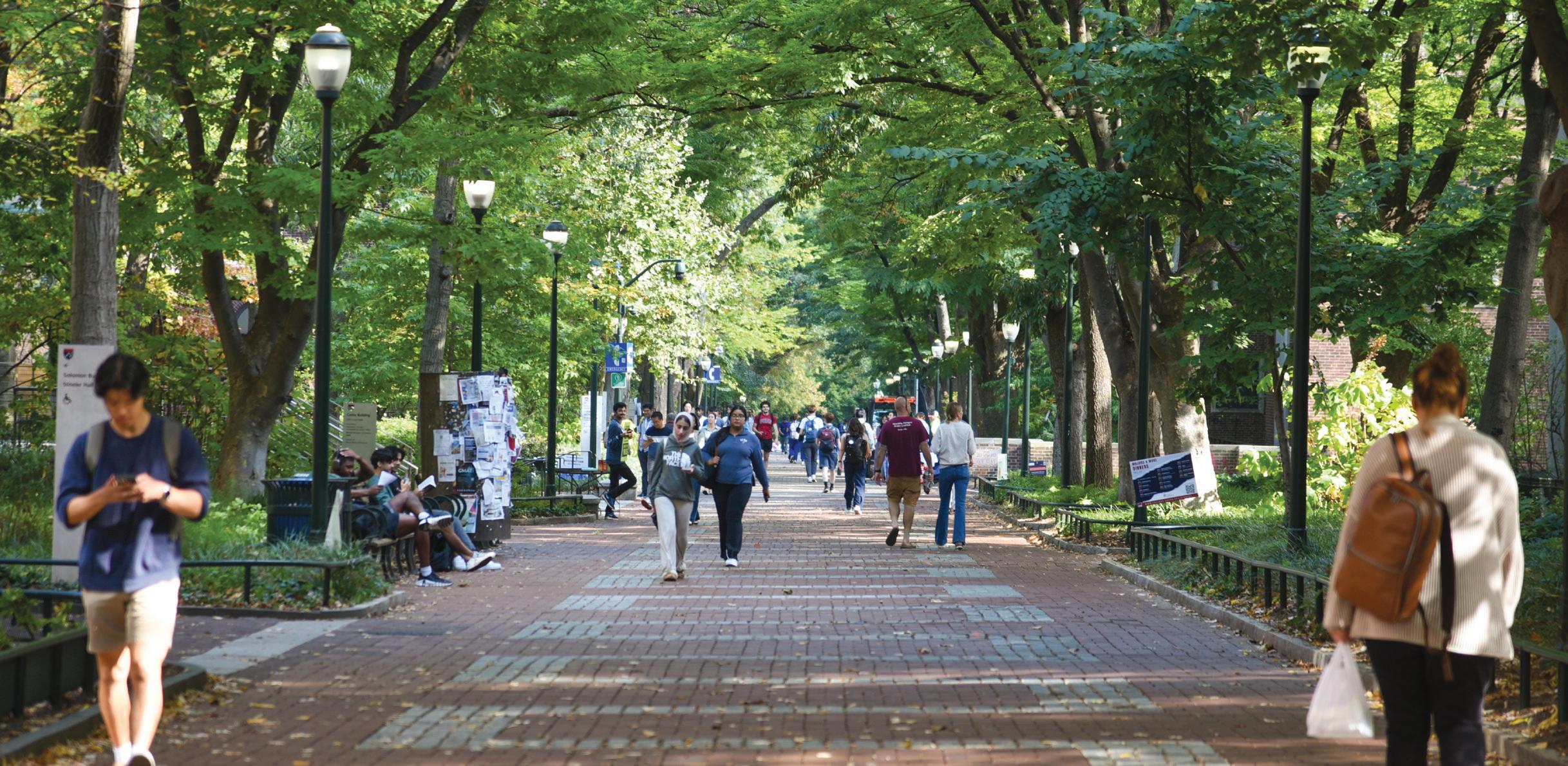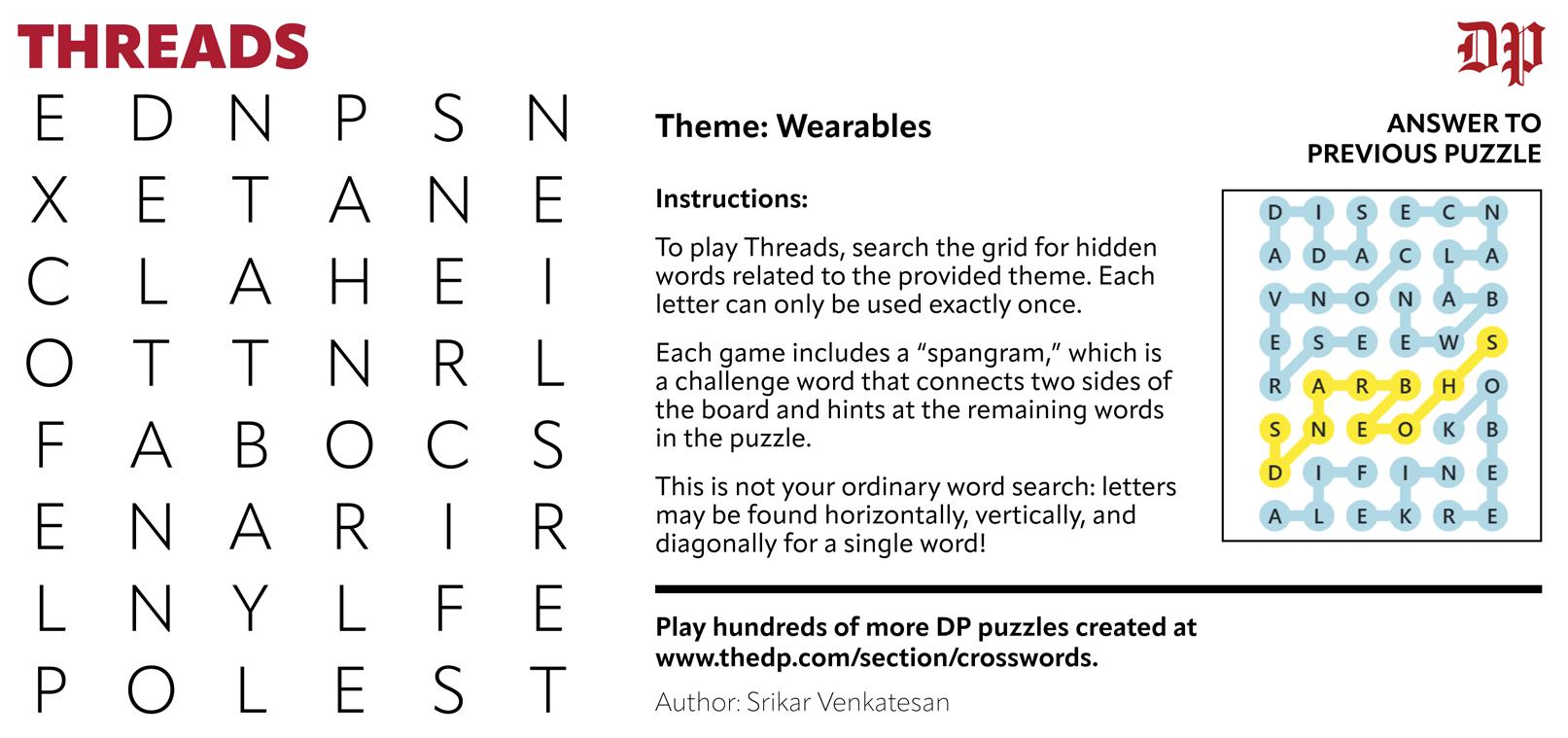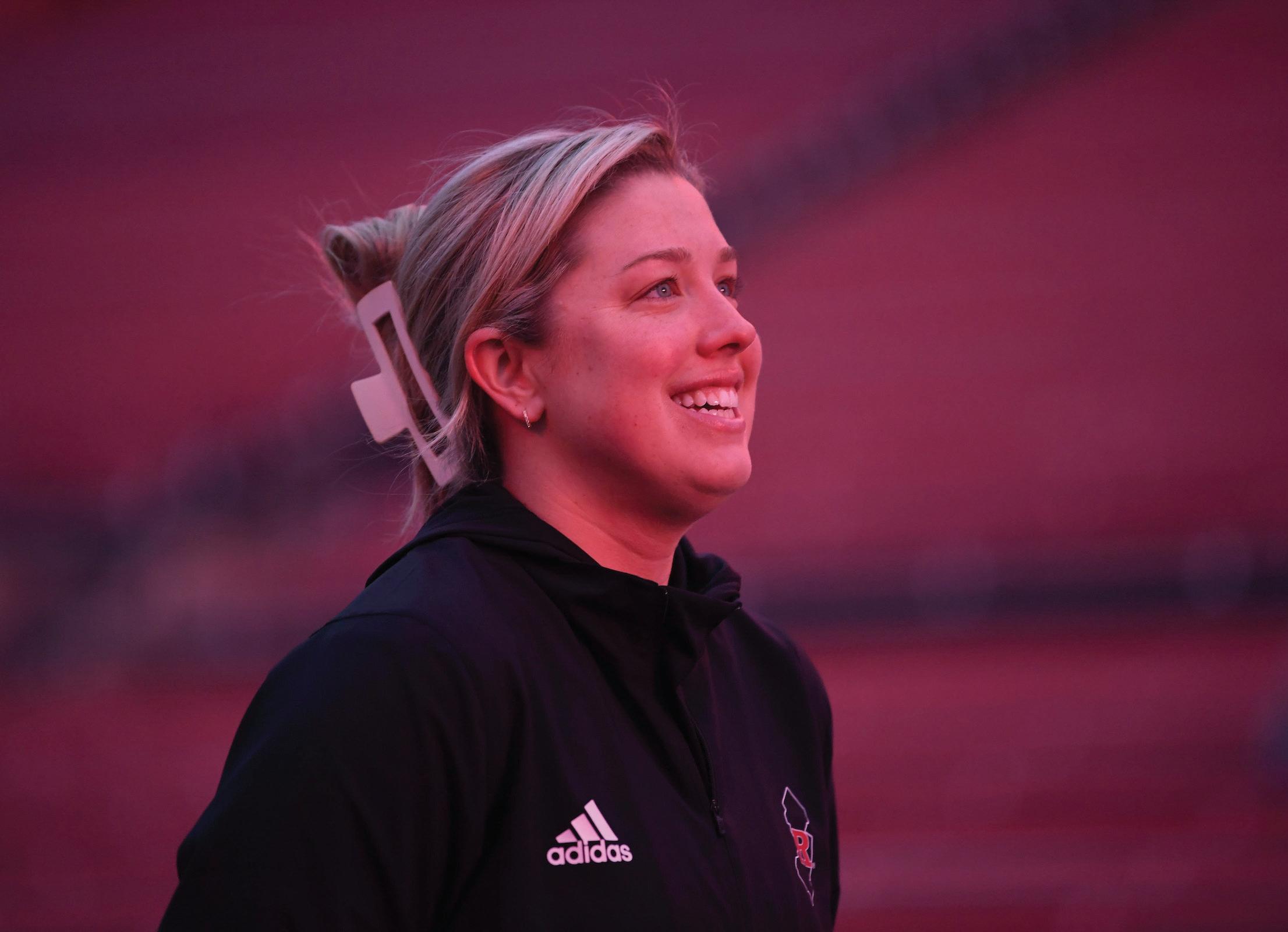Penn names Ayako Kano as director of Wolf Humanities Center
Kano currently serves as a professor in the Department of East Asian Languages and Civilizations
NEEMA BADDAM Assignments Editor
Kano was appointed director of the Wolf Humanities Center.
Ayako Kano was appointed as the new director of the Wolf Humanities Center.
Kano currently serves as a professor in the Department of East Asian Languages and Civilizations and specializes in the intersection of gender, performance, and politics, as well as in Japanese cultural history. She has been a faculty member at Penn since 1995.
“Ayako Kano is a renowned scholar of Japanese feminism whose work spans a wide range of cultural texts,” Associate Dean for Arts and Letters Josephine Park said in the announcement.
“Professor Kano is a vital presence on campus: her workshops on feminism are lively, generative spaces, and she is a legendary mentor to students and colleagues across the humanities at SAS.”
Kano’s previous positions include an appointment as a Penn Faculty Fellow during the 2011-12 Forum on Adaptations and 2014-15 Forum on Color as well as the director of the Wolf
LEE, from front page
Penn held an in-person support session on Monday. Student Health and Counseling’s Let’s Talk program also hosted drop-in hours on Friday.
CAMPUS RESOURCES
The Division of Public Safety’s HELP line (available 24/7): 215-898-HELP/215-8984357 Student Health and Counseling (if you have a personal or academic concern and want to talk to someone at Penn): 215-746WELL/215-746-9355
The University Chaplain’s Office: 215-8988456
Student Intervention Services (if you aren’t sure where to go or you’re concerned about a friend): vpul-sisteam@pobox.upenn.edu and/or 215-746-1203
Humanities Center’s Undergraduate Humanities Forum during the 2018-19 and 2019-20 academic years.
She joins the Wolf Humanities Center as it begins its Forum on Truth during the 2025-26 academic year.
“In the 2025-2026 academic year, the Wolf Humanities Center will embark on a journey to explore the multifaceted challenges involved in recognizing, defining, and grappling with both absolute and relative notions of truth,” the center’s website read. “Through a series of lectures, workshops, performances, exhibitions, and field trips, the Center aims to foster a stimulating intellectual and artistic environment for reflection and discussion, where humanities-oriented scholars, students, and the public will come together to ponder the ontological significance of truth.”
Kano’s research works include “Rethinking Japanese Feminisms,” which analyzed the first
PHOTO FROM WOLF HUMANITIES CENTER
generation of actresses in modern Japanese theater, and “Japanese Feminist Debates: A Century of Contention on Sex, Love, and Labor,” which examined Japanese feminist debates from the 1890s to the present.
In 2024, Kano was featured in the “Origin Stories” series by Omnia, the School of Arts and Sciences magazine. In the installment, she discussed her love of music, family, and vision of scholarship.
She is currently working on a book on cinematic adaptations of Japanese literature as well as a translation project of a popular text from the early modern period.
“[Kano] has a gift for sustaining intellectual communities — and then there is her writing bootcamp!” Park added. “She has spurred so many of us to get cracking on our work, and I know she will be an inspirational force for the Wolf Humanities Center.”
WELCOME, from front page
The email echoed Jameson’s remarks during the 2025 Convocation ceremony — in which he formally welcomed the Class of 2029 — encouraged students to utilize University resources, and embrace new identities.
In his welcome email the year prior, Jameson acknowledged concerns regarding open expression across the University, and other campus changes — including the resignation of former Penn President Liz Magill and scrutiny from alumni, the media, political actors, and government agencies.
Jameson concluded the email by expressing his hope for Penn’s continued leadership in various research fields and across higher education in general.
“I look forward to being in touch throughout the year to share updates on how Penn will continue to lead far into the future,” he wrote. “I am excited for everything we will achieve together.”
Drexel University’s medical leadership fellowship that was previously women-only began to admit men after Do No Harm alleged the program violated Title IX. The group has also submitted complaints to the Department of Health and Human Services in response to race-based initiatives at Duke University Health System and Geisinger College of Health Science.
, from front page
is the president of Penn Atma, the University’s female and nonbinary South Asian a capella group — described OSA’s organizing as “super uncommunicative and unsupportive during this time” in a written statement to The Daily Pennsylvanian. She described the club fair process as “stressful and uncertain,” citing problems with “changes in SAC” that delayed the sign-up process — including being required to re-register on Penn Clubs before being able to sign up for the club fair.
An OSA spokesperson wrote in a statement to the DP that the official club registration deadline was communicated to student groups, adding that OSA was not solely responsible for issues or confusion that arose.
“At the request of multiple student organizations, the deadline was extended for this year’s fair to maximize participation, resulting in a less than 24-hr turnaround time for logistical information compared to previous years,” OSA wrote. “We quickly corrected a scheduling error once identified and recognize that some students experienced confusion and stress as a result.”
According to the representative, OSA has continued to be “committed to strengthening [its] communication and processes so student groups can continue to showcase their work and connect with peers.”
SAC also wrote that its members have “been working with every club that has reached out to make sure they have a table and the opportunity to be a part of the Fall Activities Fair.”
College junior Patrick Miller, who serves as vice president of the Penny Loafers a capella group and publicity manager for Penn Singers, said that the University “kept switching their dates,” making it difficult to recruit club members to staff the table. Miller said that he heard from peers in other performing arts groups that they were forced to “skip classes” in order to staff the SAC fair while also having club members run tech rehearsals.
Miller said that his clubs “never really got any reasoning” for the schedule changes they were subject to during the fair. He explained that the clubs “didn’t have a final answer until the night before,” leaving them “less than 24 hours to figure things out.”
As a result of the logistical challenges, Miller said his groups felt a “lot of frustration with not having enough people [and] not giving people enough notice to schedule their events that are going to their clubs.”
OSA’s new rules have “been challenging,” a student leader wrote in a statement to the DP. They believe Penn’s administration has been “excessively cracking down on student organizations’ activities” including “nitpicking nearly all aspects of club guidelines — whether the club names, mission statements, logos, or other innocuous pieces of information.”
The leader described feeling “disappointed in OSA’s organization and timeliness so far this year” regarding the SAC fair. They also mentioned that their group registered for the SAC fair days before the event was scheduled to take place, but “received no communication until late during the night before the fair” which made it “very challenging” for the group to “coordinate recruitment efforts and staff the table.”
Another student leader echoed the same frustration that clubs were not given sign-ups for the fair “until a few days prior to the fair itself” and added that some clubs never received the email.
“Once they finally got everyone signed up, they didn’t tell us which date and where we would be tabling until the night before at 11 p.m., which is way too late for us to figure out who in our group would be available,” the student leader added.
“It’s hard enough to coordinate getting the members of your group to sign up for things and show up with everyone’s busy schedules and this last-minute nature made it even harder,” Kunjur wrote.
Staff reporter Sarah Shahed contributed reporting.
DING | MULTIMEDIA EDITOR
PHOTO FROM CLAIRE LEE’S LINKEDIN Lee died on Aug. 20.
OSA
Education Department requires Penn to submit incoming students’ demographic data amid DEI crackdown
Colleges and universities will be required to submit information on race, sex, academic performance, family income, and students’ Pell Grant eligibility
ALEX DASH Staff Reporter
The Department of Education will require all four-year higher education institutions — including Penn — to submit demographic, academic, and financial data on applicants.
The “Admissions and Consumer Transparency Supplement” will require colleges and universities to submit information on race, sex, academic performance, family income, and Pell Grant eligibility of incoming students, according to an Aug. 13 notice published in the Federal Register. According to the notice, the survey is meant to address concerns that “unlawful practices” may persist in admissions after the Supreme Court’s 2023 decision overturning affirmative action.
A University spokesperson wrote in a statement to The Daily Pennsylvanian that Penn “will adhere to all laws and federal regulations.”
The Education Department is acting on an Aug. 7 presidential memorandum signed by 1968 Wharton graduate and President Donald Trump, which directed Secretary of Education Linda McMahon to gather data to “provide adequate transparency” into the role of diversity, equity, and inclusion efforts in college admissions.
In the memo, Trump requested that McMahon “expand the scope of required reporting” under the Integrated Postsecondary Education Data System, a series of surveys conducted by the federal government to gather data on postsecondary institutions. The new survey will take the form of an additional supplement to IPEDS.
The survey will require institutions to submit data on both undergraduate and graduate applicants. It is unlikely to affect community colleges and trade schools, which the notice described as having
SHAPIRO, from front page
spokesperson for Shapiro’s office wrote to The Daily Pennsylvanian that “the Governor, Robb, and our Administration have regularly been engaged to combat hate and antisemitism at Penn and many other Pennsylvania universities, and we will continue to do so as we work to support students and create opportunities to succeed across the commonwealth.”
The governor’s appointment of Fox — along with the office’s broader agenda push — signaled a shift in Penn’s interactions with outside stakeholders as Fox sought to advance Shapiro’s agenda through his role with the University Task Force on Antisemitism.
“Prior to recent events, it had always been well understood that Penn was a private institution, which was something quite different from a stateoperated one,” former Board of Trustees Chair Scott Bok wrote to the DP. “Given all that has happened, getting back to a governance model appropriate for a private institution is going to be very challenging and likely take considerable time.”
Bok said that “Penn began to succumb to the influence of the state” at the end of 2023. He added that Penn’s adherence to external advice came from beyond the governor’s office; the University also began taking instruction from the federal government around the same time.
Bok resigned alongside former Penn President Liz Magill in December 2023, following Magill’s congressional testimony, where she said that whether or not calls for the genocide of the Jewish people violated Penn’s code of conduct was “context-dependent.”
Shapiro’s influence at Penn grew throughout the winter and spring of 2024. Documents revealed that the governor’s office pressured the University to ban Penn Students Against the Occupation of Palestine, the main pro-Palestinian advocacy coalition on campus. At the same time, the office worked closely with the Penn Israel Public Affairs Committee, a pro-Israel student group. In January 2024, an aide in the governor’s office sent Fox a document — apparently drafted by PIPAC — that listed several of the group’s priorities and included a call for Penn to publicly discipline students.
A month later, according to the Chronicle, a
“minimal or no risk for civil rights noncompliance in admissions.”
The 2025-26 edition of the survey will additionally require institutions to submit data on applicants, admitted students, and enrollees for the past five academic years in order to “establish a baseline of admissions practices” prior to the overturning of affirmative action.
According to the notice, the supplement aims to rectify the federal government’s “limited” ability to “ensure widespread compliance” in college admissions with Title VI of the Civil Rights Act of 1964, which prohibits race-based discrimination in institutions receiving federal financial assistance.
The survey resembles the provisions of recent Trump administration settlements over federal funding with Columbia University and Brown University, which required both universities to pay fines, turn over data on applicants, and commit to not considering race or national origin in the admissions process. The agreements also struck at the universities’ DEI programs, mandating that the schools “shall not maintain programs that promote unlawful efforts to achieve race-based outcomes, quotas, diversity targets, or similar efforts.”
The Trump administration is reportedly close to a deal with Harvard University, which could result in Harvard paying $500 million in fines to restore its federal funding. Harvard President Alan Garber denied that the university was willing to pay $500 million in a settlement, telling a faculty member that the reports were “false.”
The White House is also seeking a provision in the deal that will require Harvard to submit racial data on applicants, according to The New York Times.
Penn Fund raises over $70 million in record-setting 2025 fiscal year
The results were published in the University’s Annual Impact Report highlighting the ‘collective impact of undergraduate alumni, parents, and graduating seniors’ in supporting Penn’s undergraduates
TANISHA AGRAWAL Staff Reporter
The Penn Fund announced that it raised more than $70 million in the 2025 fiscal year — a record-breaking total nearly $15 million higher than last year.
The results were published in the University’s Annual Impact Report highlighting the “collective impact of undergraduate alumni, parents, and graduating seniors” in supporting Penn’s undergraduates. The $70,064,620 total provides support for financial aid, academic programs, and campus life initiatives.
According to the report, giving during alumni reunions accounted for a large share of contributions, with donors celebrating milestones contributing more than $8.6 million. Penn parents and families added nearly $1.65 million, while young alumni contributed about $598,000.
The report also noted that 1,604 members of the Class of 2025 joined Seniors for The Penn Fund, the program encouraging seniors to give back before graduation.
Administrators highlighted that the gifts’ true impact is felt through student experiences. The report profiled undergraduates like College senior Noah Milad and Nursing junior Hazel Ekeke, who credited alumni support with shaping their academic paths.
Milad, who studies international relations and political science, said that financial aid made his Penn education possible and that continued support gives him “the stability to thrive, lead, and envision a future of service.” Ekeke, a nursing major with minors in bioethics and urban studies, described how financial aid has allowed her to pursue additional coursework and engage with the Philadelphia community.
The report also highlighted the role of reunion classes in supporting Penn’s cultural and academic spaces. The Class of 1975 dedicated its 50th reunion fundraising to the Kelly Writers House, creating an endowment to support the center’s programming and naming the Class of 1975 Seminar Room.
“Every time I walk into Kelly Writers House, I’m held by a sense that everything will be okay,” 2023 College graduate Meg Gladieux wrote in the report. “The Writers House is always a place I feel safe to make that radical choice to write, create, and express my ideas and greatest dreams.”
KWH faculty director Al Filreis added that the gift would help the center “say ‘Yes!’ to bold student ideas, year after year.”
The report framed the fundraising results as part of a long-term trend: The Penn Fund has now set new records for seven consecutive years, with totals climbing steadily since before the pandemic. University leaders said that the sustained momentum signals continued alumni engagement and confidence in Penn’s undergraduate mission.
“The impact of your generosity will be felt on Locust Walk for years to come,” 1983 College graduate and Chair of The Penn Fund Executive Board Claudia Meer Linehan wrote. Last year, The Penn Fund raised around $55.7 million despite initial fundraising lags earlier that year. That fall, dozens of influential donors, including Apollo Global Management CEO and 1984 Wharton graduate Marc Rowan, pulled their funding, alleging the administration had failed to adequately respond to antisemitism.
Shapiro at a presidential watch party on Sept. 10, 2024.
PIPAC student leader sent a document to Fox titled “Penn Against the Occupation Most Egregious Offenses.” The document called for the University to “de-accredit” the group — and do so publicly.
In April, Penn would go on to officially revoke the organization’s status as a registered student group and ban it from campus, citing the group’s failure “to comply with policies that govern student organizations at Penn.”
“As the university undertook the important work of rooting out antisemitism and all forms of hate from its campus, we engaged Robb Fox,” a University spokesperson wrote to the Chronicle.
“Not only is Robb familiar with Penn as an alumnus, he also has a history of working with other colleges and universities. We’ve appreciated his
input, which has helped us design and implement thoughtful programs that make our campus a safer and more welcoming place for everyone.”
Throughout the 16-day duration of the Gaza Solidarity Encampment in the spring of 2024, Penn continued to send Shapiro’s office advance notice of plans, negotiation documents, and the identities of protesters.
In a letter to an aide in Shapiro’s office during the encampment, a University administrator provided the governor’s office with a list of “codes and guidelines that will be cited to encampment protesters as potential areas of violation.”
The list — which included items such as “harassment, threats and/or intimidation” and “failure to provide identification” — contained violations that had not yet occurred.
After weeks of protests, rallies, and negotiations with administrators, Penn Police Department officers — assisted by the Philadelphia Police Department — dismantled the encampment and arrested 33 people, including nine Penn students, on May 10, 2024. The move, which followed the University’s decision to place six student organizers on mandatory leaves of absence, drew strong criticism from members of the Penn community and local elected officials.
Later in the day, Manuel Bonder, Shapiro’s press secretary — when asked about the sweep — wrote in a statement that Penn had “made the right decision.”
“Unfortunately, the situation at Penn reached an untenable point,” he added.
MOIRA CONNELL | DP FILE PHOTO
The Undergraduate Admissions Visitor Center is located in Claudia Cohen Hall.
CHENYAO LIU | SENIOR PHOTOGRAPHER
The Kelly Writers House received funding from the Class of 1975.
NATHANIEL BABITTS | DP FILE PHOTO
You belong here
GUEST COLUMN | A welcome
There is nothing quite like the first days of a new school year. I have felt it walking along Locust Walk, listening to laughter spill out from College Green, watching students reunite with friends and mentors in College Houses, and settling into favorite campus spots. It is good to be back. I am so glad you are here.
Whether you are arriving at Penn for the first time or returning with a well-worn PennCard and full calendar, this moment belongs to all of us. I have already had the chance to meet new students who are eager to dive into research, launch new ventures, and make their mark in the arts and on the field. I have spoken with families who are beaming with pride, and faculty and staff who cannot wait to support you every step of the way.
This year, I am thinking about what it means to begin again. Not just to start fresh, but to build on what came before: to scaffold original ideas, new friendships, and fresh goals (yes, I have noticed the literal scaffolding around Fisher Fine Arts Library too). It is a fitting reminder that progress takes protection and preservation. Growth happens in stages, sometimes slowly — and the strongest structures rise from solid foundations.
Penn is a place where we build together. We build knowledge, community, and character.
message from Penn President Larry Jameson
We challenge each other to think deeply and act boldly. We support each other through setbacks and celebrate each other’s successes. We do all of this in a city that has a history of invention, imagination, and at times, a motivational underdog mentality. And we do it at a University founded by one of history’s greatest innovators, Benjamin Franklin.
As we begin this new semester, I encourage you to take care of yourselves and each other. Prioritize your well-being. Explore the extensive array of health and wellness resources — from fitness classes to intramural sports to rock climbing to the newly renovated Sheerr Pool and to the recovery room. These spaces and programs are thoughtfully designed to support your physical and mental health while you are here.
New beginnings are also a fantastic time for trying new things. Opportunities abound at Penn, and you never know what might spark your interest. Maybe it is joining a club you had not considered, going to a performance or athletic competition, or signing up for a lecture or symposium on a topic you are unfamiliar with. You might find yourself at an SNF Paideia event, in conversation with someone whose perspective opens your own. Or, you might happen upon a food truck with
Build something that matters at Penn
GUEST COLUMN | As you start this year, begin building something that matters
About a year ago, I met with then-Engineering sophomore Maxx Yung, who is studying materials science and engineering. “I’ve been studying memory since sixth grade when my grandmother died from Alzheimer’s,” he told me outside Saxbys Coffee.
Yung was researching semiconductors and biomaterials in the Singh Center for Nanotechnology and quickly becoming obsessed with a simple idea. The human brain processes information far faster and more efficiently than the most advanced computer chips. Yung wanted to start building biological chips, which combine living cells with computer hardware. If successful, he could cut carbon emissions from computing by 1,000 times of what they are today. Yung recently dropped out of Penn to launch a company doing just that.
There’s never been a better time to build on campus. But there’s an open secret at Penn, and it becomes obvious as soon as New Student Orientation turns into on-campus recruiting. Top students are funneled toward big corporations only to spend their time making tiny changes to massive codebases and slide decks. Smart young people get stuck doing work that doesn’t matter.
It doesn’t have to be this way. I know because I saw it firsthand, initially as an undergraduate at Penn and now as the founder of Critical, a venture capital firm that invests in students tackling major crises.
During the beginning of my junior year, 2021 College graduate Aaron Kahane, a thenstudent and good friend who was one year ahead of me, shared a Google Sheet for organizing annual donations. An observant Jew, like me, Kahane committed to giving away 10% of his income and wanted to make sure I was as organized to do the same (I wasn’t). I found the sheet so useful that I quickly duplicated it. I’ve used it ever since.
After graduating from Penn, Kahane paired up with his college roommate, 2020 Engineering graduate Salomon Serfati to launch Chariot, a startup that makes it easier to donate money to charities. The team was accepted into Y Combinator and is now one of their fastest-growing Series A companies, servicing thousands of nonprofits that represent over 10% of the $500 billion sector.
I’m energized to be an investor in Kahane and Yung. But we need more disruption, sooner. We need more young people building things that matter.
Every day, our team hears about major crises: construction companies looking for greener steel and cement; researchers searching for cheaper, more accessible clinical trials; families seeking affordable options for childcare and eldercare; high school guidance counselors overwhelmed by widespread student mental health struggles. There are
important issues in search of talented people. I believe Penn’s ecosystem offers a solution. Penn is the ideal place to begin building. Beyond the formal entrepreneurship infrastructure, which is robust and growing, campus is where you meet your co-founders, mentors, and supporters. Roommates become co-conspirators. Classes become incubators. Lab principal investigators become advisors. Professors and alumni become angel investors. This was true for me. I met my co-founders during a pre-orientation hiking program, PennQuest. We became inspired to start a company during professor Dennis Culhane’s first-year seminar about homelessness and housing, found mentorship from professor Tyler Wry, and eventually won the President’s Engagement Prize.
Penn students, researchers, and recent alumni are building some of the most important, mission-obsessed companies. These founders are mitigating the opioid crisis, expanding food access, creating healthier fish-supply chains, and improving sustainable delivery. They aren’t just good for the world, they’re also generating real revenue.
Since I first arrived on campus in 2018, these companies, among others in climate, healthcare, and economic mobility, have raised $1 billion from leading investors and created over $5 billion in economic value.
That’s without accounting for the Weissman Lab’s critical role in developing the Moderna and Pfizer’s COVID-19 vaccines.
As these companies continue to scale, the next decade will tell an even larger story. Huge outcomes will be tied to meaningful change. That’s the next generation of innovation.
In many ways, this is why I came to Penn.
I recently dug up my original college application, and, rereading it, I realized I got a lot wrong about Penn (and myself). But as a 17-year-old I got one thing right: “I know Penn’s resources will serve as a source of inspiration and a reminder of why I’m on campus,” I wrote. They enable students to live by Benjamin Franklin’s philosophy of converting knowledge into action.
So maybe Penn’s real secret is that talented people come here to build things that matter. What will you build this year?
SAM STRICKBERGER is a 2022 College graduate. He served as the class president of the Class of 2022 and was a recipient of the President’s Engagement Prize. Now, he is a partner and co-founder at Critical Venture Partners, an early-stage venture capital firm investing in students tackling major crises. His email is s@critical.vc.
smells so tantalizing that you cannot resist stopping by. I hope you find the time to visit a Cultural Resource Center or attend a reading by a world-renowned author at the Kelly Writers House. As you explore, do not hesitate to ask for help — and offer it when you can.
Most of all, remember that you belong here. Not just because of what you have already accomplished, but because of everything you are still becoming. It is going to be a productive and rewarding year. It’s great to have you back, Quakers.
J. LARRY JAMESON is the 10th president of the University of Pennsylvania. His email is president@ upenn.edu.
Penn picked you, but why did you pick Penn?
ON THE RECORD | Penn’s name holds weight, but it shouldn’t carry your college decision
Penn. Short, sweet, and powerful. The name holds a certain prestige in people’s minds, not only because of its Ivy League status. It represents something valuable — something to be proud of. Teachers beamed when you told them where you would be going to college. Friends smiled, impressed. When you called your grandma, as always, she was proud of you.
And yet, the name isn’t why I chose Penn.
Of course, the numbers and reputation are hard to ignore: a ranking in the top 10 universities (with the Wharton School ranked No. 1 among undergraduate business schools), a member of the Ivy League, and an undergraduate student population of under 11,000. When Vice Provost and Dean of Admissions Whitney Soule announced Penn’s record-low 4.9% acceptance rate for this year’s incoming class, conversations resurfaced about Penn’s elite status. More competitive, more prestigious, more proof that the name “Penn” holds significant value.
It’s easy to frame Penn as a symbol of exclusivity, as it is increasingly selective in choosing top valedictorians, nonprofit founders, world champions, and future leaders. But we rarely ask the inverse: Why did we select Penn?
Like others in the Class of 2029, I chose Penn without stepping into a Huntsman Hall lecture or joining a club advertised on Locust Walk that changed my sense of purpose.
But I didn’t choose Penn just because it chose me. I chose it because it’s the kind of place where the name isn’t the whole story — it’s the start of it. At most top institutions, opening doors for students is a given. However, Penn offers more. Penn hints at a place where ambitious students hold together a collaborative and equally competitive community.
Perfect? Hardly. Competitive? Definitely. Easy? Certainly not. But the right starting point for my next four years of adventures? Without a doubt.
The reality of that starting point looks different for everyone. Some students appreciate the promise of hands-on research as first years. Others relish the opportunity to double major in two diametrically opposed fields. Penn’s range and flexibility don’t force us to narrow our interests. They invite us to explore.
Like many other Penn students, Wharton first year Meera Tewari chose Penn over other top institutions. “I was deciding between the Ross School of Business at the University of Michigan and Wharton,” Tewari said. “Even though Ross was in state and a fantastic option, I ultimately chose Penn for Wharton’s
global recognition, the flexibility of its curriculum and concentrations, and the idea of being in Philly, a big city with so much history and culture, while still having opportunities to connect with the local community.”
The culture at Penn isn’t easy to describe. Yes, it’s ambitious. But Penn also creates momentum. Not pressure, but possibility. This ambitious nature draws students to Penn. Because here, ideas don’t just live inside lecture halls — they get tested, built, and pitched. Wharton first year Annalise Leck echoed that sentiment: “I chose Penn because Wharton’s unmatched resources and opportunities make it the best place in the world to study business.” She reflected on her time in the 2023 Wharton Global Youth Program, saying, “I’ve seen the drive and ambition of its students up close, and it’s indescribably inspiring and unique to Penn.”
A common theme emerges: Penn fosters an ambitious community, especially in the context of its research-driven environment. “Penn’s emphasis on hands-on undergraduate research captivated me. Its synergy of collaboration and innovation is truly unique,” College first year Klara Molnar-Tanaka said.
Other students considered both athletic and academic offerings at Penn — not just focusing on the name, but also the opportunities. Simon Lioznyansky, a Wharton first year on the men’s fencing team, considered that balance carefully. “I chose Penn over other schools because I knew I wanted to do business,” he said. “Obviously, there’s nowhere better in the U.S. for business than Wharton.”
Aside from academics, Lioznyansky also evaluated the athletic possibilities at Penn. “Another choice for me was fencing,” he continued. “I was trying to get recruited to any top-tier school for their NCAA team, so after I won one of the biggest senior events in the U.S., I immediately got an offer from Penn. As my top choice, I accepted instantly.”
Think of Penn as a starting line: the people, the programs, the promise that there’s no single mold. The next four years are yours to define.
So when your dentist, best friend, or someone on your grandma’s Facebook asks, “Why Penn?” — don’t think of Penn as a label or a status symbol. Penn is more than its name. Congratulations and best wishes to the Class of 2029!
MISCHA WIJESEKERA is a Wharton first year from Houston studying finance. Her email is mischaw@wharton.upenn.edu.
PHOTO BY ERIC SUCAR | COURTESY OF UNIVERSITY COMMUNICATIONS Jameson pictured posing with the Quaker mascot.\
ABHIRAM JUVVADI | STAFF PHOTOGRAPHER Columnist Mischa Wijesekera discusses the reasons why students should choose Penn beyond its name recognition.
ABHIRAM JUVVADI | STAFF PHOTOGRAPHER Guest columnist Sam Strickberger argues that students should focus on creative entrepreneurship with the power to change the world.
As the student newspaper, The Daily Pennsylvanian captures what Penn students keep writing about. Year after year, author after author, certain lessons learned from the Penn experience reappear. From these, we can deduce where Penn fails and succeeds, but more importantly, what its students think newcomers should know.
1. Penn is different from whatever you’re picturing. As 2017 College graduate Alec Ward wrote, Penn is much more complex than the idea many students arrive with. For many, it’s the pinnacle of diverse academic excellence: images of mahogany libraries, stone archways, and debates in tweed blazers. For others, it’s job offers from every top firm by sophomore year and late nights with future CEOs. Ward suggests dropping whatever notion you’ve created in your mind, as the real Penn is much different from admissions brochures or your own curated fantasies.
2. You, and everyone else, “deserve” it.
As College sophomore Marie Dillard observed, feeling out of place at Penn isn’t uncommon. Being at Penn can feel alienating when surrounded by the ever-present wealth and privilege that depict what students should wear, say, and do. What can we learn from Dillard? There is no one way — one person — that belongs at Penn. Penn students might feel pressure to look or be like the “right” kind of student. Whether you’re a legacy, a QuestBridge scholar, a future consultant, or somewhere in between, Penn admitted you for a reason. Spending time obsessing over who truly “deserves” to be here assumes, and more importantly, affirms, there’s only one mold to fit — which is not only a waste of time, but wholly untrue.
3. Most classes won’t change your life. Guest columnist and 2019 College graduate Celeste Marcus critiqued Penn Students’ obsession with instant gratification and taking classes merely for a resume boost. It’s true, even Ivy League classrooms aren’t immune to careerism. If anything, they’re created for it. You can’t expect every class at Penn to be deep, meaningful, or life-altering. But you shouldn’t shy away from taking “useless” classes outside of your major. You might learn something — or not. Either way, the goal is to keep learning without expecting anything in return.
4. The first people you meet don’t have to be the only ones.
2020 College graduate Elias Rappaport emphasized the importance of saying “yes” in your first few months at Penn. First-year students are presented with, as Rappaport described, “a daunting hallway of unmarked doors.” These
doors are opportunities, many of which won’t get opened but some will lead somewhere meaningful. It’s easy to cling to that first door: a roommate, hallmate, or high school friend, but Rappaport’s advice is to keep exploring. You might not find your people right away; that’s normal. The most meaningful relationships often grow from unexpected corners.
5. Penn is “sceney.” Penn in itself has a social scene, a “Hunger Games” of sorts, as College sophomore Diya Choksey called it. She advises students of the most important currency on Penn’s campus: “access: the right clubs, the right jackets, the right fraternities to be seen at.” Greek life is more than just a party scene — but a player in Penn’s social climate. What does Choksey think you can learn? “The point isn’t to reject the game. It’s to stop letting it play you.” Whether it’s Greek life or “the scene,” it’s your decision alone to participate.
6. Get off campus. During your first year, it’s easy to stay in what 2024 College graduate Daniel Gurevitch referred to as the “Penn Bubble.” He called it an echo chamber, where students live, eat, and socialize within the same few blocks of Penn’s campus. But Gurevitch advised, and I would agree, that it is essential to leave campus as soon and as often as you can. Penn’s food is unsatisfying,
the dorms are stuffy, and there is a beautiful and thriving city just a short walk away. Go sit in Rittenhouse Square, go eat in Fishtown, go past 40th Street. Gurevitch says it’s critical to burst the Penn bubble.
7. Clubs aren’t that serious.
As College sophomore Ananya Shah described, the club applications cycle starts almost as soon as you move in. As the club fair lines Locust Walk, it’s easy to feel the pressure of a second admissions season. Friends will spend hours poring over resumes, short essays, and preparing for coffee chats —oftentimes for clubs that don’t exist outside of a GroupMe. Everyone wants to join the same clubs, knows a friend in it, or didn’t make it past the first round. Rejection is to be expected, and in fact, Shah says it is a privilege we should embrace. Clubs aren’t that serious. Join ones you like, or none at all: “your club involvements do not define you.”
8. It’s OK to take time off. Penn moves quickly, and the pressure to always be “on” is real. As 2024 College graduate Brinn Gammer wrote, the pressure to work and earn to the point of burnout is a facet of Penn’s campus culture. And even if it’s not academics as your stressor, being a college student will test your mind and body regardless. Gammer suggested investing in yourself: Take walks, spend
time with friends, and protect what makes you feel good. If that means taking a nap instead of studying, or getting DoorDash instead of going out, do it. It’s you who matters.
9. Let Penn change you. And to visit my own words of reflection after finishing my first year, it’s okay if you change. I came in convinced I wasn’t going to become the epitome of a Penn student. But Penn, if you’re doing it right, has the power to make you grow into the person you want to be. Not comfortably, and not always in big ways, but it’s yours to shape. And who wants to be the high school version of themself forever? Definitely not me.
10. Don’t listen to upperclassmen. Finally, the real message in all of this, you don’t have to, and as Wharton senior Francesco Salamone thought, maybe you shouldn’t listen to any of these students (including me). Penn is yours to figure out, to shape, and to enjoy in your own way. Take what helps, forget the rest, and let your experience be entirely your own.
PIPER SLINKA-PETKA is a College sophomore studying health and societies from West Virginia. Her email address is pipersp@sas. upenn.edu.
CHENYAO LIU | SENIOR PHOTOGRAPHER
Senior columnist Piper Slinka-Petka gives first years 10 pieces of advice from older students.
‘I still have it’: Women’s squash junior Malak Khafagy embodied grit during her PSA World Series run
From airport chaos to an injury on the court, Khafagy turned a nightmare of setbacks into a breakthrough win
HANNAH CHANG Sports Associate
“Everything that shouldn’t have happened, happened already.”
There are moments when a single interaction — or in junior squash player Malak Khafagy’s case, a match — seems to encapsulate our circumstances in life.
Khafagy’s squash match in El Gouna, Egypt in April was just that: a representation of the struggles she was going through. Yet, it proved to be exactly what she needed.
The match was not looking promising even before Khafagy stepped on the court. Khafagy and her teammate on the Egyptian team were on the plane, ready to fly from Pakistan to Egypt, when it was announced that the plane was having engine problems and would fly out the next morning. Her match — in the Copper tier of the Professional Squash Association’s world tour — was in El Gouna in just 48 hours.
Khafagy and her teammate slept at the airport that night, only to hear the next morning that their flight was canceled again. It was now 24 hours before her match in Egypt, and she was still stuck in Pakistan. She decided to take things into her own hands and booked another flight out of pocket to Cairo, while her teammate decided not to compete in Egypt.
Khafagy didn’t really have much of a choice.
“[In Pakistan], you can’t leave the hotel. You can’t eat.
And I got pretty sick in Pakistan because of the food and the water,” Khafagy said. “When you leave the hotel, you have to leave in a bulletproof car with a bunch of soldiers around you.”
Khafagy suffered a tough loss at the Under23 World Squash Championships in Pakistan and was ready to go back home to Egypt after time away, but also to bounce back at another match.
Since the Penn squash season ended and she was competing professionally on her own, Khafagy was traveling alone. Her strength and conditioning coach in Egypt, who had trained her since before she arrived at Penn, would have usually accompanied her. But he had recently died, and she felt the weight of his absence.
“It was kind of hard for me to deal with the fact that he’s not there anymore, because he was like a father to me … I notice[d] that I’m struggling a lot mentally because of that,” Khafagy said. Going back to Egypt was a chance to win and make up for her loss in Pakistan, but it was also a familiar place after being stuck in a foreign country — a place to restart and refocus.
Khafagy landed in Cairo at 1 a.m., and her match was scheduled for 12 p.m. the same day in El Gouna — a town seven hours away by car. She emailed the tournament officials to see if the match could be rescheduled to 6 p.m. that day, just to give her more time to travel and rest. After the officials received proof of her travel itinerary and permission from her opponent, Scotland’s Georgia Adderley, the match was rescheduled.
That was perhaps the only thing that went according to plan during this string of professional matches. After arriving at the airport just outside of El Gouna, Khafagy stood at baggage claim, waiting
for her bag that had her squash clothes, shoes, and racket — only to find out that it never came.
Khafagy knew she had to improvise to able to compete in the PSA match. Her younger sister had been in South Africa for a squash tournament of her own, and she was landing in Cairo that morning.
Roughly the same size as her sister, Khafagy decided she would borrow her sister’s clothes and shoes as well as her friend’s racket. Again, with her own money and without telling her sister, she bought her sister a plane ticket from Cairo to El Gouna.
Khafagy looked back with a laugh while recounting the story, but she noted that it felt horrific. She was tired from the difficult travel, frustrated by her recent defeat in Pakistan, sad she lost her coach, and overall, overwhelmed by life.
However, to support her, her sister, parents, friend from her squash club, and squash coach were all watching her in El Gouna, cheering her on.
The match consisted of five games, and Khafagy lost the first game and won the second. It was the beginning of the third when, somehow, amid all the lunges, short sprints, drives, and strokes, her knee started to bleed, and Adderley alerted the referee. In squash, bleeding can cause the player to concede the game.
Because the match was held later at 6 p.m., all the other matches had already finished in the morning and the paramedics had gone home, so Khafagy’s friend took one of his white socks, put it on her foot, cut off the top, and slid the thin fabric until it covered her knee and stopped the bleeding.
“I was impressed,” Khafagy admitted. “I was really impressed. I’m like, ‘Okay, you saved my life twice here, man.’”
It was a makeshift bandage, a symbol of the hard work she and her loved ones had put in to stop the bleeding of her difficult few days and months.
But the referee automatically gave the third game to Adderley, so it was the beginning of the fourth game, and Khafagy needed to win the next two games to secure the match.
“Obviously, I was panicking, I’m not gonna lie. … My heart started pumping so much more than usual,” Khafagy said. “Everything that shouldn’t have happened, happened already. … I don’t know why my knees started bleeding. I don’t know why she told the ref that I was bleeding and I don’t know why the ref was so harsh on me [instead of giving me a warning].”
It was the sort of panic that made her eyes water.
“I’m so tired, I’m so drained. And you know,
when you travel for so long, all you have is lactic acid in your legs. So you basically can’t move either,” Khafagy said. The current match wasn’t the only one on her mind. In Pakistan, she had lost in the quarterfinals of the U23 World Squash Championships, which made her stay up until 6 a.m.
“When you’re too invested in something and you’re giving everything you have for that sport, and then you lose, it’s more. It’s just so much more than just a match … or just a tournament. You get all those flashbacks from all the time you trained and all the efforts you put [in], all the sacrifices you’ve made,” Khafagy added.
It all came crashing down at this moment, in these last two games of the match, with her knee bound up in her friend’s sock. Tears were building up in her eyes. Her legs were feeling like lead. Her clothes, shoes, and racquet felt foreign in her hands against her skin.
And that’s when she knew she needed to calm herself down.
“I kept telling myself, ‘The match is not over yet. Don’t get too hot, don’t get too excited, don’t get too sad,’” Khafagy recalled.
And she just played, ignoring her emotions, the pain, the tiredness. Stroke after stroke, until she won game four, 11-5. She went on to also win the last game, 14-12.
She went to her mom and immediately hugged her. After her loss in Pakistan, she had also called her mom and cried. The tears this time, in Egypt, were different — just as exhausted, but with a weight off her shoulders.
There, after everything, Khafagy embraced her mom.
We the parents, Nighat Sultana and Mohammed Mohiuddin, residing at 710 North 44th Street, Philadelphia, USA, have changed our child’s name to Aswad Uddin Akif. The petition for name
PHOTO COURTESY OF PENN ATHLETICS
Khafagy pictured swinging her racket during a game.
“I told you, [mom], I still have it,” Khafagy said. While Khafagy did not win the El Gouna International Squash Open, she took the grit and lessons learned into the summer, where she claimed the biggest win of her PSA Squash Tour career at the Santiago Open.
Texas trip, Christmas Classic highlight women’s basketball’s 2025-26 schedule
Women’s basketball tips off its season at home against King’s College on Nov. 7
CONOR SMITH Sports Associate
It’s that time of year again. On Tuesday, Penn women’s basketball released its 2025-26 schedule, giving fans an early glimpse into the season. The Quakers tip off their year at home against King’s College on Nov. 7, also accessible via ESPN+. Last season, Penn willed its way into the Ivy League Tournament after a 2-6 conference start. A
major factor in their playoff berth was now-sophomore center Katie Collins, who was named the Ivy League Rookie of the Year. Collins averaged 10 points, 7.2 rebounds, and 1.6 blocks per game. The Quakers, who finished 15-13 overall and 6-8 in the Ivy League, ultimately fell to Columbia in the Ivy Madness semifinals.
Let’s unpack what this year’s schedule holds: Pod play Penn will tip off Big 5 play on Nov. 12 at Drexel in the 29th iteration of the “Battle of 33rd Street.” After making an NCAA Tournament appearance in 2024, the Dragons went 17-13 last season before falling in the
semifinals of the Coastal Athletic Association tournament. Along with a pod win, the teams are also vying for the upper hand in their rivalry, as they are split 14-14 all time.
Penn’s second Big 5 matchup comes against Saint Joseph’s at home on Nov. 24. Last season, the Hawks went 24-10 and placed second in the Atlantic 10 tournament. Penn will be facing a very different St. Joe’s squad, though, as the Hawks graduated six seniors and saw two players transfer.
The Quakers will compete in the women’s Big 5 Classic at Villanova on Dec. 7. Seeding will be based on team record in pod play.
Holiday hoops
The Quakers are getting no holidays off this year.
The team will be celebrating Thanksgiving in Texas this year as they will take a two-game road trip to the Lone Star. On Nov. 28, Penn will take on Division III St. Thomas in Houston, marking the first-ever matchup between the programs. It will be a homecoming for freshman guard Ruke Ogbevire, who is from Houston.
Penn will then travel to Austin to play Texas on Nov. 30 for its toughest matchup of the season. Last season, Texas finished 35-4 and made a Final Four appearance. The only other time the programs competed was in the 2014 NCAA Tournament. In coach Mike McLaughlin’s first postseason run leading the program, the 12th-seeded Quakers fell to fifthseeded Longhorns 79-61.
During winter break, the Quakers will compete in the second annual Fairleigh Dickinson Christmas Classic. On Dec. 29, Penn will play Maryland Eastern Shore at FDU in Hackensack, N.J. The team will then take on either FDU or Binghamton on the next day of the Classic.
“Adding a trip to Texas and other strong non-conference opponents will test us early and prepare us for the battles ahead,” McLaughlin said in a statement released with Penn Athletics. “Our group is eager to embrace the journey and continue to grow together throughout the season.”
Ivy slate Penn will open up Ivy League play on Jan. 3, 2026 at home against Princeton.
Last season — for the first time in Ivy history — the conference sent three teams to the NCAA Tournament. Harvard gained an automatic bid after winning the Ivy title, while Columbia and Princeton both earned atlarge selections. The odd team out? Penn. Penn was the only team that made Ivy Madness that did not receive an at-large bid after barely scraping into the conference tournament. In recent memory, the Quakers have not fared well against the top of the Ivy League. Combined, Penn is 1-13 (including tournament games) against Harvard, Columbia, and Princeton over the past two seasons. To be the best, you have to be able to beat the best. The Quakers will have six chances to do so against the conference’s top programs next season.
workshops and webinars for assistant coaches.
“Ally’s infectious passion for the game — and for Philadelphia — makes her a perfect fit for Penn women’s lacrosse. We know she’ll embrace the grit, fight, and pride we bring to the field every day,” Brower said.
Penn women’s lacrosse has been one of the Red and Blue’s strongest programs. Last season, the team notched a 12-7 overall and 5-2 conference record — good for third in the Ancient Eight. The program reached the NCAA tournament for the third straight season. In the quarterfinals, the Quakers faced a 17-12 heartbreaking loss against No. 3 Northwestern for the second straight year. Looking ahead to this spring, the Red and Blue plan to continue their deep tournament runs even with the graduation of program record holders Anna Brandt and Erika Chung.
“This program’s tradition, passion, and commitment to excellence are truly inspiring,” Deaver said in a press release. “I can’t wait to get to work with such an incredible staff and driven group of student-athletes. Let’s make something special happen.”
Sydney McLaughlin-Levrone. The performance qualified her for Team USA’s world championship team. The championships are set for Sept. 13-21 in Tokyo.
into the 2025 World Squash Junior Championships, helping bring Team USA to the championship finals for the first time in history. The Americans finished with the silver medal, while Team Egypt — the defending champions — claimed another title.
FOOTBALL , from back page
West did not log a rushing attempt last season, and Williams ran the ball just 12 times in four appearances.
“[Running back is] probably the one position where early players can play and can tap in [into the starting lineup] really early,” Priore said. “[Hosley], as a freshman, came in and started after his third game, but I do believe the upperclassmen will be able to lead us our way through it. … We’ll find the best system.” No matter if Penn employs a bell cow back, like last season, or a run-by-committee approach, Penn’s rushing attack will be anchored by one of the best offensive lines in the conference. The Quakers’ offensive line boasts five returning starters, including two FCS Football Central Preseason All-Americans in senior linemen Netinho Olivieri and William Bergin.
“You got five returners up front,” senior quarterback Liam O’Brien said. “It’s exciting, right? All those guys have played with each other, they’ve got experience, and that’s your foundation. Those guys really provide all the potential for our offense, and so they’re going to take us where we need to be.”
them to an 11-5 halftime lead that grew to 21-11 at the final buzzer to secure the championship.
come true. This is just the beginning of a long rollercoaster journey in this sport.”
Isabella Whittaker — women’s track and field
The world is Isabella Whittaker’s oyster after the 2024 College graduate ended her senior year with six Ivy League championships and three All-American honors in individual sprints and sprint relays. Just after walking the stage at Franklin Field, she broke out on the global stage, qualifying for the Team USA 4x400-meter relay pool for the 2024 Paris Olympics.
Although she was pulled from the relay at the Olympics, Whittaker brought this momentum into her graduate season at Arkansas, winning two NCAA indoor championships and setting new NCAA, American, and North American records for the women’s indoor 400m dash — just 0.07 seconds shy of the world record. Whittaker moved to the professional circuit after making a homecoming to Franklin Field at the Grand Slam Track Philadelphia stop earlier this year.
In August, Whittaker competed in the 400m dash at the 2025 USA Outdoor Track and Field Championships, winning the semifinal and finishing second in the final with a time of 49.59 seconds behind
“[A]fter making the [O]lympic team in the relay pool but being pulled from the relay the morning of, [I] never quite felt like [I]’d earned my spot. [I] let insecurity and doubt creep into my head and snag the joy and pride [I] had in making that team,” Whittaker wrote in an Instagram post following the race. “[I] told myself that [I] would never again let someone else or that little nagging voice inside my head determine whether or not [I] was capable of doing something special or whether [I] belonged. [E] cstatic to say that after a year of working my a$$ off, [I] have put my pen to paper and made my first worlds team individually.”
Alexander Dartnell — men’s squash
Even before coming to Penn, freshman Alexander Dartnell was very familiar with West Philadelphia. The Arlen Specter US Squash Center — located just across Market Street on Drexel’s campus — is home to the United States squash team that he has represented in international competition since 2023 and that recently hosted the 2025 U.S. Junior Open Squash Championships. At that competition, Dartnell did not drop a single game en route to a second national championship. He is currently ranked No. 1 in the nation in the U19 division.
This past summer, Dartnell took this momentum
Dartnell will undoubtedly be valuable this season to two-time defending national champions Penn men’s squash in the team’s quest for a three-peat and to cement a dynasty.
“Getting the silver medal at worlds this year in Cairo was incredible. … To make history this summer was surreal. Now, heading into my college career, I’m excited for new challenges and to continue the legacy the Penn men’s squash team has started,” Dartnell wrote to The Daily Pennsylvanian.
Anna Brandt — women’s lacrosse
After making her mark in the record books — ending her collegiate career as Penn’s all-time leading scorer and the Ivy League Midfielder of the Year and after leading Penn back to the NCAA tournament for the third straight season — 2025 Wharton graduate Anna Brandt continued onto greater stages. She shone at the USA Lacrosse national team training camp and was selected to don the red, white and blue at the inaugural Pan-American Women’s Lacrosse Championship — her first international tournament.
At the championships in June, Brandt scored two goals in the team’s title-clinching victory against Team Canada. The Americans’ deep talent drove
“I love this sport, I’ve grown up with it, so to be able to do what I love and represent the country that I love is a dream come true. It’s the biggest honor,” Brandt told USA Lacrosse Magazine. “Every time I get to put on this uniform, I’m so grateful and feel so blessed to be around the most incredible people.”
Anna Kalandadze — women’s swimming and diving In just three seasons wearing the Red and Blue, 2024 College graduate Anna Kalandadze wasted no time making her mark on the collegiate stage — and she isn’t stopping there. At Penn, Kalandadze annually qualified for NCAA championships in both the 500-yard and 1,650-yard freestyle and collected four Ivy League championship titles across both events, continuing a legacy of Penn distance swimming dominance. In her final collegiate meet, Kalandadze finished fourth — ahead of Olympians — to collect All-American honors with a time of 15:47.86. She didn’t stop there, as after graduation, Kalandadze qualified for the U.S. Olympic Trials in the 800meter and 1,500-meter freestyle.
The pool continued to call Kalandadze’s name, and she answered. After a year of training, Kalandadze was selected to compete at the 2025 World Aquatics Championships in Singapore earlier this summer, representing Team Georgia.
LYDIA TONG | SENIOR PHOTOGRAPHER
Collins pictured attempting a floater against La Salle during Big 5 play on Dec. 6, 2024.
PHOTO COURTESY OF RUTGERS UNIVERSITY
Deaver pictured at a game.




